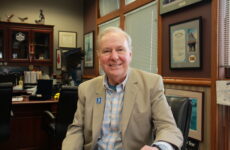 Gun violence is a repetitious, destructive force in the United States of America. Fortunately or unfortunately, the right of the American people to bear arms is protected by the Second Amendment to the U.S. Constitution.
Gun violence is a repetitious, destructive force in the United States of America. Fortunately or unfortunately, the right of the American people to bear arms is protected by the Second Amendment to the U.S. Constitution.
Typical responses to mass shootings in movie theaters, workplaces, public schools, places of worship, and concert venues are community mourning for the ill-fated victims and short-term news coverage spotlighting drama and horror in the aftermath of the event.
Blame is often placed on one mentally ill shooter who should never have owned a gun in the first place. Survivors are interviewed and 911 calls are played and replayed on network news channels. Energetic squabbles about gun control laws dominate public debate until people forget the most recent tragedy because they are carried away into a new cycle of entertainment news produced for profit.
The one constant in the aftermath of mass American gun carnage is a pledge to uphold the status quo for citizens bearing arms until the next mass shooting occurs- possibly in your neighborhood.
When it inevitably happens again, a similar cycle of prayer vigils, mass mourning, short-term news coverage, and enthusiastic gun control debates recycle and repeat. This is the American way.
New Zealand, if America chooses to pay attention, gave the world a more effective model for handling white supremacy, gun violence, and vilification of the so-called other non-white person or immigrant in society.
On Friday, March 15, a gunman attacked worshippers at two mosques in Christchurch. Fifty people were killed and nine fatally wounded. Prime Minister Jacinda Ardern refused to speak the shooter’s name. The response countrywide was rapid, practical, and compassionate.
Rather than labeling immigrants as rapists from “shithole nations” and fueling the likelihood of mass shootings and targeted hatred toward the other, something President Donald Trump did in America, political leaders and citizens in New Zealand responded with kind hearts and empathy toward the Muslim community.
Prime Minister Ardern wore a hijab to show solidarity with Muslims in New Zealand. The prime minister embraced the hijab as a symbol to unite people in her country and promote healing after this national tragedy rather than rejecting the scarf that some Muslim woman use to cover their hair as foreign and other. Many other New Zealand women joined their prime minister in wearing a hijab including television presenters and police officers.
A week after the attack at the mosques, the Muslim call to prayer was broadcast on national television and radio stations at the same time the attack occurred. The decision to broadcast the call to prayer nationally was another restorative gesture that brought citizens together rather than driving them apart on the basis of religion or national origin.
Newspapers used space to explain Muslim practices surrounding funerals and prayers. Once again, New Zealanders chose the path to reconciliation and identification rather than division and difference. Education is essential to understanding and eradicating ignorance in any nation.
The speaker of New Zealand’s parliament, Trevor Mallard, the prime minister, and news commentators opened speeches and newscasts with the Arabic greeting, “peace be upon you” or as-salamu alaykum.
Less than a week after the senseless gun violence happened in Christchurch, changes to strengthen the country’s gun control laws and ban semiautomatic and assault rifles were scheduled to go into effect by mid-April 2019.
And, may peace also be upon you.





Comments